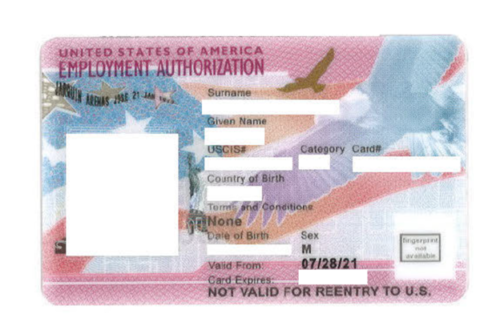
Understanding the Spouse Visa and Fiancé(e) Visa
Comparing Spouse and Fiancé(e) Visas
Let’s say you are a U.S. citizen engaged to marry someone from Chile and hope to marry them in the U.S. Perhaps you are a lawful permanent resident that has been married to a Canadian for one year. You want to live together in the U.S. but are uncertain about the process. This post will give you a general overview of each process and the respective filing fee costs.
Another thing to keep in mind is that processing times are always subject to change without notice. If you prefer to have a set date for your wedding, the spouse option would be a better idea since you can’t predict with certainty when your significant other will get his/her fiancé(e) visa.
Understanding the Spouse Visa
There are two visas your foreign spouse may obtain: an immigrant visa (IR-1 or CR-1) or a nonimmigrant visa (K-3). The nonimmigrant visa, if used at all, is obtained while waiting for the immigrant visa, and permits your foreign spouse to reside in the U.S. temporarily. Although the need for a nonimmigrant spouse visa has become rare due to the processing time, I will still talk about it below so you have an idea of what it entails. A U.S. citizen or lawful permanent resident (green card holder) can petition for a spouse.
Immigrant Spouse Visa (IR-1 or CR-1)
Assuming your spouse will be processing at a U.S. consulate/embassy abroad, she will get either an IR-1 or a CR-1 visa based on how long you two have been married. The IR-1 (immediate relative) visa is for those married for more than two years. Upon entry to the U.S., your spouse will receive a green card for 10 years.
The CR-1 (conditional resident) visa is for those married for less than two years. If your spouse obtains a CR-1 visa classification, she will receive a 2-year conditional green card. You and your spouse will have to apply to “remove the conditions” on her green card 90 days prior to the 2-year expiration. To remove the conditions, you will need to file Form I-751, Petition to Remove Conditions on Residence. You can read more about the I-751 here.
If you have been married for less than 2 years when you start the process, but the marriage is more than 2 years old by the time the visa is granted, your spouse will get the IR-1 visa, which will grant her the 10-year green card upon her arrival in the U.S.
Nonimmigrant Spouse Visa (K-3)
The purpose of the K-3 visa is to allow your spouse to enter the U.S. while you two wait for the I-130 to process. Once the I-130 is approved, your spouse would be able to remain in the U.S. and apply for adjustment of status and get her green card while staying the U.S. without having to leave. By doing this, you would be paying an additional $1225 in filing fees.
To be eligible for this K-3 nonimmigrant visa, you need (1) a valid marriage and (2) a properly filed Form I-130, Petition for Alien Relative for your foreign spouse. The K-3 visa is filed by using Form I-129F.
If your spouse enters the U.S. on a K-3 visa, but the Form I-130 is subsequently rejected, then your spouse has 30 days before their K-3 status is terminated.
NOTE: As the processing times for the K-3 visa nonimmigrant visa are about the same as the I-130, you may be better off skipping the nonimmigrant visa altogether. Also, you would be paying quite a bit less in filing fees, and it’s likely that your spouse would get her green card faster to have the whole process go through the U.S. consulate/embassy based on the current processing times. However, make sure to ask if this would be a good option for you since every case is different.
Understanding the Fiancé(e) Visa (K-1)
You will want the fiancé(e) visa so that your foreign fiancé(e) may travel to the U.S. and marry you, a U.S. citizen, within 90 days of her arrival. Keep in mind that only U.S. citizens can petition for a fiancé(e).
The fiancé(e) visa is much like the K-3, nonimmigrant spouse visa. They both exist to keep couples together while waiting for a more permanent immigration option. Also, both visas require Form I-129F, Petition for Alien Fiancé(e). Both visas also, as you will see below, result in additional expenses. What gives the fiancé(e) visa continuing relevance is the desire to marry in the U.S. instead of abroad for convenience or other reasons.
An overview of the steps of obtaining a fiancé(e) visa are as follows:
- File Form I-129F with USCIS. Submit as much evidence of your relationship as you can.
- Upon approval by USCIS, your case will go to the National Visa Center (NVC) and then to the U.S. Embassy or consulate where your fiancé(e) lives where he/she will be interviewed by an officer.
- Inspection at a Port of Entry. A fiancé(e) visa does not guarantee admission to the U.S. She will still have to pass an inspection before entering.
- Marriage. You must get married within 90 days of your fiancé(e) entering the U.S. The K-1 visa will be good for a 6-month period allowing your fiancé(e) one entry into the U.S. with that visa. Once your fiancé(e) enters the U.S., the 90-day window begins.
- Application to Adjust Status. After you are married, your fiancé(e) will need to apply to adjust status to get his/her green card.
Comparing the Costs of the Spouse and Fiancé(e) Visas
Immigrant Spouse Visa (CR-1 or IR-1)
- The filing fee for Form I-130, Petition for Alien Relative is $535.
- If you are going through consular processing, there will be a $325 Immigrant Visa Application processing fee, a $120 Affidavit of Support fee, and a $220 USCIS Immigrant Fee
- The total cost filing fee costs for a spouse visa where your spouse is going through consular processing is $1200
- For CR-1 (conditional residency), you will eventually have to file Form I-751 with a filing fee of $595 plus $85 for a biometric service fee.
- If you go the option of wanting to get the K-3 visa, you would pay $535 (I-130 fee) + $265 (K visa fee) + $1225 (adjustment of status fee) = $2025.
Fiancé(e) Visa (K-1)
- The filing fee for Form I-130, Petition for Alien Relative is $535.
- $265 (K visa fee) + $1225 (adjustment of status fee) = $1490.
As far as filing fees go, the least expensive option would be to do the spouse visa. Also, based on current processing times, if you go through consular processing and you are a U.S. citizen, the spouse visa will be the fastest option for your spouse to get her green card.




